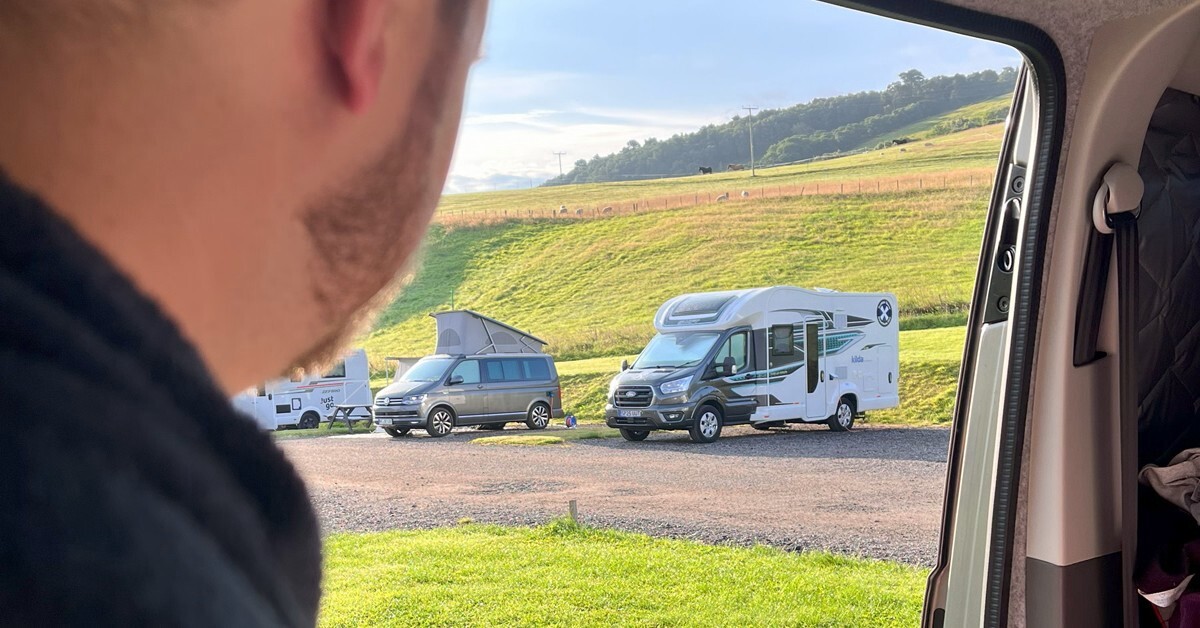Motorhome vs. VW Campervan Conversions.

Campervan Conversion vs Motorhome: Which is Right for You?
From spontaneous weekends in the countryside to long summer holidays overseas, more and more people are discovering the freedom of the open road. If you’re thinking about joining them, one question often comes up first: campervan vs motorhome - which is the better choice?
We’ll admit that we’re a bit biased when it comes to campervans. But with good reason. They’re compact enough for daily life, smart enough for long-haul escapes, and versatile enough to fit almost any lifestyle. Whether you’re parking up at a festival, heading off-grid for the weekend, or doing the school run midweek, a well-built campervan just fits.
In this guide, we’ll explore why campervans are the go-to for so many people, what sets them apart from motorhomes, and how to choose the best setup for the way you travel.
What is a VW campervan conversion?
A VW campervan conversion takes a standard vehicle (most commonly the Volkswagen Transporter) and transforms it into a fully equipped home on wheels.
Unlike a motorhome, which is built from the ground up as a leisure vehicle, a conversion starts with a van chassis and adds everything you need for travel and overnight stays. This means it can stay as an everyday driver as well, in a way that a motorhome can’t.
Typical features of a VW campervan conversion
- A fold-out bed or upgraded rear seat bed
- A compact kitchen with a hob, sink, fridge, and storage units
- An optional pop-top roof for extra headroom and sleeping space
CamperKing’s expertise
At CamperKing, we specialise in VW campervan conversions tailored to different lifestyles, such as:
- Compact designs for solo adventures or couples
- Family-friendly models with multiple travel seats
- Custom finishes to match your style down to the last stitch
The Volkswagen base guarantees reliability and drivability, while our craftsmanship ensures a stylish, practical interior. This blend of everyday usability and holiday-ready features is why campervans become lifestyle companions that justify their investment for years to come.
What is a motorhome?
A motorhome is a purpose-built leisure vehicle, designed from the ground up to be a home on wheels. Unlike a campervan conversion, which begins life as a standard van and is then converted, motorhomes are coachbuilt and usually much larger.
Typical features of a motorhome
- Spacious kitchen with oven, hob, and fridge freezer
- Bathroom facilities, often with a shower and a toilet
- Large seating and dining areas
- Fixed double or twin beds
This size and self-contained design mean motorhomes can feel more like traditional holiday homes, offering more living space and comfort than most campervans.
Comparing campervans vs motorhomes
When weighing up campervan ownership vs motorhome ownership, a few key considerations can help you make the right choice. Your decision will largely depend on how and where you plan to travel, who’ll be joining you, and the kind of lifestyle you’re after.
Comfort and living space
Motorhomes
Motorhomes are larger vehicles with fixed double beds, lounge areas, and full bathrooms. They’re often seen as homes on wheels, appealing to those who prioritise maximum space and comfort on extended trips.
Campervans
Campervans are more compact and efficient by design. A well-converted VW campervan typically includes a fold-out bed, kitchen with hob, sink and fridge, and smart storage solutions. Optional pop-top roofs add valuable sleeping or standing space without increasing the footprint.
Weighing up the two
Motorhomes usually offer more space, but good campervan conversions – like those from CamperKing – pack in impressive features such as diesel heaters, solar panels, and power management systems. This makes them fully capable for year-round travel, without the added bulk. If you’re happy with clever design over sheer space for the sake of it, a campervan might just tick every box.
Costs: purchase, running, and maintenance
Motorhomes
Motorhomes generally represent a larger investment upfront, and their running costs reflect their size. Insurance tends to be higher, fuel economy lower, and servicing or repairs more expensive due to their complexity and size.
Campervans
Campervans are generally more affordable across the board. Being built on reliable van platforms like the VW Transporter also means easier access to parts and servicing. They’re more fuel-efficient and often cheaper to insure, making them ideal for first-time owners.
VW campervans, in particular, are known for their strong resale value and demand, making them a smart investment as well as a lifestyle choice.
Weighing up the two
Campervans are typically more cost-effective and easier to live with, especially if you plan to use them regularly. Motorhomes can be great for long-term travellers, but they come at a higher ongoing cost.
Flexibility and lifestyle fit
Motorhomes
With more living space, motorhomes suit extended touring and long holidays, especially if comfort is the top priority. However, they’re less nimble, harder to park, and often restricted in towns and smaller roads.
Campervans
Campervans offer everyday usability and on-the-go adventure in one. You can use them for weekends away, festivals, family holidays, or even the school run. Their size means you can park almost anywhere and access places motorhomes often can’t.
Weighing up the two
If you’re after flexibility, campervans are tough to beat. They’re just as suited to everyday life as they are to spontaneous getaways. For families, couples, and solo adventurers, they strike a great balance. If you prioritise fixed beds and larger interiors, motorhomes may appeal more.
Campervans vs motorhomes: pros and cons summary
In the end, both campervans and motorhomes have their place. But if you’re looking for flexibility, practicality, and something that blends into daily life with ease, a campervan offers a hard-to-beat balance of adventure and convenience.
| Feature | Campervans | Motorhomes |
|---|---|---|
| Size & driving | Compact, car-like to drive, easy to park almost anywhere | Larger and less agile, can be tricky to manoeuvre and park in tight spots |
| Comfort & space | Thoughtfully designed with fold-out beds, compact kitchens, and smart storage | More space but bulkier layouts, often prioritising size over versatility |
| Flexibility | Doubles as a daily driver and getaway van, ideal for quick escapes and weekend adventures | Suited to longer trips but less practical for everyday or short-notice travel |
| Running costs | Lower fuel use, affordable insurance, and widely available servicing (especially VW platforms) | More expensive to run and maintain, with fewer service options in some areas |
| Purchase price | More accessible entry point with strong resale value, particularly with VW conversions | Higher upfront investment with slower resale in some cases |
| Off-grid capability | Compact but adventure-ready, often with diesel heaters, solar panels, and pop-top options | Equipped for off-grid use but may require larger pitches or facilities due to size |
| Lifestyle fit | Versatile choice for families, couples, or anyone after a mix of daily use and travel | Better suited to those prioritising home comforts over flexibility |
Questions to ask yourself before buying
Here are some helpful questions to consider before investing in a campervan or motorhome, focused on your lifestyle, budget, and travel plans.
How often will I use it?
Regular adventures or everyday driving often suit a campervan best, while longer seasonal trips may lean towards a motorhome.
Where do I want to go?
Campervans are easier to handle in cities, rural lanes, and on spontaneous getaways. Motorhomes tend to be better suited to stays at larger campsites.
How many people will be travelling?
For couples or small families, campervans usually offer the right balance of space and practicality. Motorhomes add room but may feel excessive for shorter or simpler trips.

.jpg)